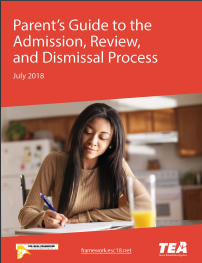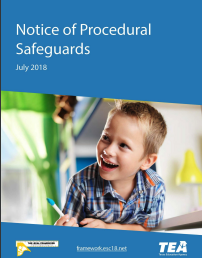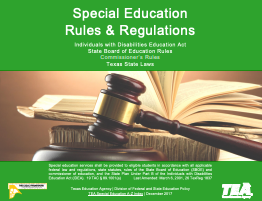Special Education
Special Education Services
All children are entitled to educational opportunities consistent with their ability to learn. The teamwork of our staff of dedicated professionals combined with the support of our community equals positive outcomes for our students. We recognize and encourage parent participation. It is an essential and vital element of the total education process. Together, parents and the school form a team to determine quality services for these exceptional children. We encourage parents to participate in ARD meetings, ask questions, and work closely with their child’s teacher and school.The federal law (IDEA) uses the below terms to define a “child with a disability”. Individuals qualify for special education services when they have one or more of the following disabilities, according to state and federal guidelines:
- Autism
- Deaf-blindness
- Deafness
- Emotional disturbance
- A hearing impairment
- Intellectual Disability
- An orthopedic impairment
- Other health impairment
- A specific learning disability
- A speech or language impairment
- Traumatic brain injury
- A visual impairment including blindness
- Multiple disabilities
Special Education resources
Admission, review and dismissal (ARD Guide) process

Learn more about the ARD process and your rights and responsibilities in this document created by the statewide leadership for The Legal Framework project team and the Texas Education Agency(TEA).
Notice of procedural safeguards

If you have any questions about the information in the ARD Guide or Notice of Procedural Safeguards or need someone to explain it to you, reach out to one of the local special education contacts listed below.
- Elicia Villa, Director of Special Education Services
- Tel: (214) 628-9128, Email: evilla@eciacharter.com
- Kelly Bevis, Program Coordinator-Special Populations
- Tel: (972)348-1568, Email: kelly.bevis@region10.org
- Spedtex, Special Education Information Center
- Tel: 1-855-773-3839
 Read More
Read MoreTexas Transition and Employment Guide
The resources below have been created by the Student-Centered Transitions Network (SCTN) to assist educators and families with implementing quality transition services for students with disabilities..SB 139 Notice to Families
IDA, Dyslexia, MTSS, and Section 504
The documents linked here have been created as general resources for families on the topics listed below: English:- Dyslexia
- Delayed or Denied Evaluations and Compensatory Services
- Multi-Tiered Systems of Support
- Section 504
- Ley de Educación para Personas con Discapacidad
- Evulaciones Retrasadas o Denegadas & Servicios Compensatorios
- Sistemas de Soporte Multi-Niveles
- Artículo 504
Compensatory Services
Compensatory services are used to help students make up forprogress or skills they lost when their special education services were not provided. This includes situations where a child does not get special education services because he or she was denied a timely initial evaluation, but later found eligible.
If an initial evaluation was denied when it should not have been, compensatory services may be needed to make up for the delay in your child getting special education services.
Helpful Websites
The Legal Framework The Texas Education Agency and Region 18 Education Service Center partnered to provide a compilation of state and federal requirements for special education organized by topic.
Texas Project FIRST Families, Information, Resources, Support & Training Created by parents for parents, this website is designed to make it easy to find Texas Education Agency (TEA) information and resources specific to students with disabilities and their families.
Special Education in Texas A-Z Index An index of Special Education related terms with links to appropriate information on The Texas Education Agency website.
Region 10 ESC Region 10 Education Service Center, located in Richardson, provides school districts and charter schools in the northeast Texas area with professional development, programs, and services designed to improve student achievement and school district efficiency.
